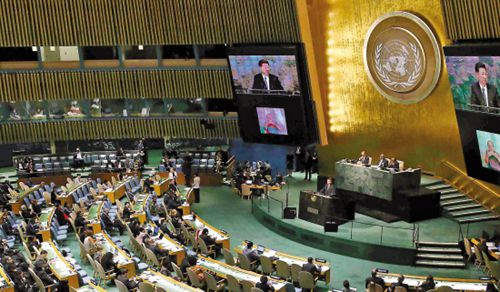South-South cooperation gets stronger voice in 2015①
Updated: 2015-12-19 06:19
(CCTV.COM)
|
|||||||||||
In 2015, the South-South cooperation initiated by developing countries has resounded through the multilateral cooperation forums. We witnessed the Asia and Africa Leaders' summit in Djakarta in April, South-South cooperation round table conference held by China and United Nations (UN) Assembly in New York in September and the Forum on China-Africa Cooperation in Johannesburg in December.

Many people from developing nations had expressed their support to strengthen cooperation. Chinese President Xi Jinping had addressed three conferences, showing Beijing's sincere efforts to promote South-South cooperation. Beijing joined developing countries to initiate a new type of international relations featuring balance, fairness, inclusiveness and win-win. Djakarta: Asia and Africa leaders' meeting
In April, leaders from Asian and African countries had assembled in Djakarta to celebrate the 60th anniversary of the Bandung Conference, while discussing friendly common development. The conference was a milestone event between Asians and Africans.
On the basis of the Five Principles of Peaceful Coexistence, the conference put forward doctrines to deal with interstate relations, which played a pivotal role to enhance cooperation between Asia-Africa, South-South, as well as South-North.
With the spirit of Bandung, the regional, sub-regional and trans-regional cooperation between Asian and African countries continues to rise with their roles and status in international affairs. Peace, development, cooperation and win-win have become trendy actions. The situation of "me in you, you in me" links the world to a community of common destiny.
The Bandung Spirit is endowed with vitality. Asian and African countries have taken on new missions, giving new connotations, propelling a new international relationship with win-win cooperation and directing the international order into a more fair and reasonable manner, in a bid to build a community of human destiny that benefits Asia, Africa and other regions.
Xi offered three proposals to deepen Asian-African cooperation. Both continents are an important birthplace of civilizations with 3/4 of the world's population and more than half of UN member states. The region is endowed with greater global significance.
In the face of new opportunities and threats, Asian-African countries should share together the danger and safety, help each other in adversity, grasp opportunities and overcome challenges. We should raise the cooperation level to remain good friends, partners and brothers sharing joys and sorrows together.
We should expand South-South cooperation, since developing countries face common tasks to accelerate growth and improve livelihoods; and we should stay together for warmth, help each other move forward, carry out cooperation in different fields and put forward our respective development blueprint into practice.
Realizing Asian-African cooperation serves as an important model for South-South cooperation. We should also strengthen solidarity with developing countries in Latin America, South Pacific and other regions that enhance exchanges to boost communications on international and regional issues, while defending world peace and promoting common development.
The Bandung Spirit enlightens us on South-North cooperation, as well. Realizing balanced development cannot be established while some countries are growing richer, others have gotten poorer and less developed.
The South-North relationship is more than economic development, but concerned with global peace and stability. According to Xi, Beijing has pioneered Asian-African solidarity and cooperation. Under the new situation, China will double its efforts to promote the Asian-African cooperation.
By Ling Dequan, Researcher, Center for World Affairs Studies, Xinhua News Agency
(to be continued)
Today's Top News
IMF head ordered to face trial over Tapie affair
China, Russia sign over 30 deals on Medvedev visit
Xi calls for shared future in cyberspace
China successfully launches its first dark matter satellite
China becomes shareholder in European bank
Jeb Bush calls Trump a 'chaos candidate'
French report stresses China's growth offers new opportunities
Reasonable economomic growth rate targeted
Hot Topics
Lunar probe , China growth forecasts, Emission rules get tougher, China seen through 'colored lens', International board,
Editor's Picks

|

|

|

|

|

|






